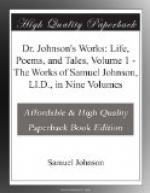Johnson derived from his parents, or from an unwholesome nurse, the distemper called the king’s evil. The Jacobites at that time believed in the efficacy of the royal touch, and, accordingly, Mrs. Johnson presented her son, when two years old, before queen Anne, who, for the first time, performed that office, and communicated to her young patient all the healing virtue in her power[c]. He was afterwards cut for that scrophulous humour, and the under part of his face was seamed and disfigured by the operation. It is supposed, that this disease deprived him of the sight of his left eye, and also impaired his hearing. At eight years old, he was placed under Mr. Hawkins, at the free school in Lichfield, where he was not remarkable for diligence or regular application. Whatever he read, his tenacious memory made his own. In the fields, with his schoolfellows, he talked more to himself than with his companions. In 1725, when he was about sixteen years old, he went on a visit to his cousin Cornelius Ford, who detained him for some months, and, in the mean time, assisted him in the classics. The general direction for his studies, which he then received, he related to Mrs. Piozzi. “Obtain,” says Ford, “some general principles of every science: he who can talk only on one subject, or act only in one department, is seldom wanted, and, perhaps, never wished for; while the man of general knowledge can often benefit, and always please.” This advice Johnson seems to have pursued with a good inclination. His reading was always desultory, seldom resting on any particular author, but rambling from one book




